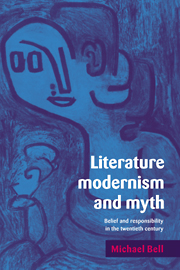2 - Varieties of modernist mythopoeia
Published online by Cambridge University Press: 18 December 2009
Summary
W. B. YEATS: ‘IN DREAMS BEGIN RESPONSIBILITIES’
William Butler Yeats (1865–1939) was a mature poet in a late romantic mode before he remade himself into a modern one. He was also an influential figure whose political beliefs, particularly in his later years, were disturbing. Yeats often presented himself as a poet rather than a man of truly political interests, as in his poem ‘Politics’ responding to a remark of Thomas Mann.
‘In our time the destiny of man presents its meaning in political terms’ – Thomas Mann
How can I, that girl standing there,
My attention fix
On Roman or on Russian
Or on Spanish politics?
In the context of the thirties, this treads a dubious line between honesty to mood and a would-be seductive fecklessness, and Conor Cruise O'Brien has shown that Yeats was highly, if not consistently, political. As O'Brien says, it is not enough to accept Yeats's own statement by detaching the poetry from the politics, and, he concludes, the power of Yeats' poetry derives precisely from the darker elements on which it draws.
Yeats' poetic career remains open to different interpretations, especially on the question of whether his transformation from ‘romantic’ to ‘modern’ was really a radical change or rather a way of keeping faith with an old conception in a new world. Even now, he preserves a cunning elusiveness, and not least at the moments in which he may seem most unambiguously accessible.
- Type
- Chapter
- Information
- Literature, Modernism and MythBelief and Responsibility in the Twentieth Century, pp. 41 - 119Publisher: Cambridge University PressPrint publication year: 1997



